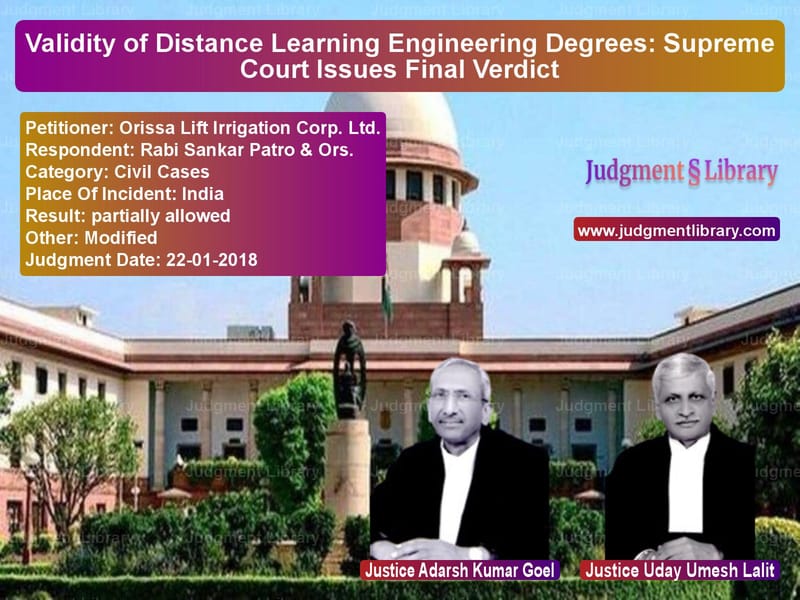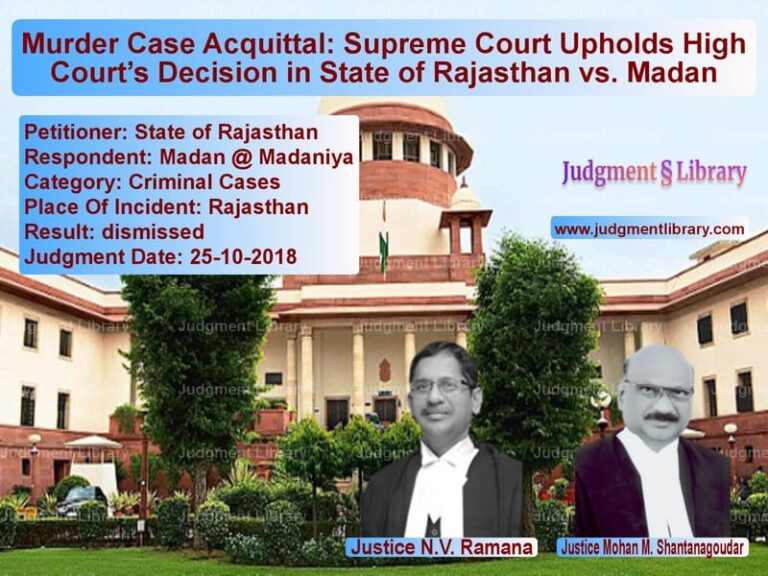Validity of Distance Learning Engineering Degrees: Supreme Court Issues Final Verdict
The case of Orissa Lift Irrigation Corp. Ltd. vs. Rabi Sankar Patro & Ors. revolved around the validity of engineering degrees obtained through distance education mode from deemed-to-be universities. The Supreme Court of India, in its judgment dated January 22, 2018, addressed the concerns of thousands of students who had earned engineering degrees through distance education from various institutions.
This landmark judgment has far-reaching implications for students, employers, and the broader education system in India, as it establishes clear guidelines regarding the recognition of such degrees.
Background of the Case
The issue arose when several deemed-to-be universities started offering engineering degrees through distance education mode without obtaining proper approval from the All India Council for Technical Education (AICTE). This led to concerns about the quality and legitimacy of such degrees.
The affected candidates included:
- Students who had already completed their degrees and were employed.
- Students who had pursued higher education based on these degrees.
- Government employees who used these degrees for career advancement.
The Supreme Court was approached to decide on the validity of such degrees and their impact on the careers of those who had obtained them.
Key Issues Raised
The case presented several legal and procedural questions:
- Were the engineering degrees obtained through distance education from deemed universities valid?
- Could these degrees be used for employment and further education?
- What measures should be taken to address concerns of affected students?
Petitioner’s Arguments
The petitioners, including the Orissa Lift Irrigation Corporation Ltd., argued that the degrees obtained through distance education lacked proper approval and quality control. They contended:
“The institutions offering these programs failed to secure the mandatory approval from AICTE. As a result, these degrees should not be recognized for employment or higher education.”
The petitioners also emphasized that technical education, especially engineering, requires hands-on training, which cannot be effectively delivered through distance education.
Respondent’s Arguments
The respondents, who were degree holders from these institutions, contended:
“Our qualifications were obtained in good faith, and we should not be penalized for regulatory failures of the institutions. Many of us have been employed for years, and disqualifying our degrees would jeopardize our careers.”
They further argued that some of the deemed universities were well-established and had a history of providing quality education.
Supreme Court’s Verdict
After examining the arguments, the Supreme Court ruled:
- Engineering degrees obtained through distance learning from JRN Rajasthan Vidyapeeth, IASE, and Allahabad Agricultural Institute (AAI) were invalid.
- Such degrees cannot be used for employment purposes or for pursuing higher education.
- All affected students must pass a test conducted by AICTE to validate their degrees.
- For candidates who fail the AICTE test, their degrees will stand revoked.
- The ruling applies only to engineering degrees and not to other disciplines.
The Court also issued specific directives:
“All candidates who obtained engineering degrees through distance education mode between 2001 and 2005 are required to take a test conducted by AICTE. If they pass, they can retain their degrees; otherwise, their degrees will be invalid.”
Implications of the Judgment
This judgment has significant implications for students, universities, and employers:
- Students: Many students who obtained degrees through distance education now face uncertainty regarding their qualifications.
- Universities: Deemed universities offering technical programs via distance education must now seek AICTE approval.
- Employers: Companies employing candidates with such degrees must reassess their credentials.
- Government Agencies: Public sector organizations must revise recruitment and promotion criteria.
Conclusion
The Supreme Court’s ruling in Orissa Lift Irrigation Corp. Ltd. vs. Rabi Sankar Patro & Ors. underscores the importance of regulatory oversight in technical education. While the judgment protects the integrity of engineering education, it also provides a fair opportunity for affected students to validate their degrees through an AICTE-conducted test.
The ruling sets a precedent for higher education institutions, emphasizing that adherence to regulatory norms is essential for the credibility of academic programs.
Don’t miss out on the full details! Download the complete judgment in PDF format below and gain valuable insights instantly!
Download Judgment: Orissa Lift Irrigati vs Rabi Sankar Patro & Supreme Court of India Judgment Dated 22-01-2018.pdf
Direct Downlaod Judgment: Direct downlaod this Judgment
See all petitions in Education Related Cases
See all petitions in Contract Disputes
See all petitions in Public Sector Employees
See all petitions in Judgment by Adarsh Kumar Goel
See all petitions in Judgment by Uday Umesh Lalit
See all petitions in partially allowed
See all petitions in Modified
See all petitions in supreme court of India judgments January 2018
See all petitions in 2018 judgments
See all posts in Civil Cases Category
See all allowed petitions in Civil Cases Category
See all Dismissed petitions in Civil Cases Category
See all partially allowed petitions in Civil Cases Category







